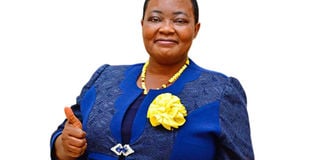Prime
What government is doing to realise SDGs

Robinah Nabbanja
What you need to know:
- The government remains fully committed to the implementation of the SDGs and achieving the 2030 Agenda
I am proud to share with you the remarkable progress our government has made in the implementation of the SDGs and our journey towards the 2030 Agenda.
The SDGs provide a transformative framework that guides our nation’s development efforts, focusing on alleviating poverty, promoting social inclusion, protecting the environment, and fostering sustainable economic growth. In this article, I will highlight our government’s role in implementing the SDGs and shed light on our path towards achieving the 2030 Agenda.
Leadership and commitment: The Government recognises the significance of the SDGs in shaping our nation’s future. We have embraced the SDGs as a strategic roadmap for sustainable development, aligning them with our national priorities and development plans.
To demonstrate our commitment, we collaborated closely with the United Nations and other partners to develop a National SDG Roadmap (2018-2020), which served as a catalyst for the SDGs implementation across the country.
This roadmap outlined priority actions to accelerate progress towards the SDGs and the creation of the SDG Secretariat.
One of the key steps taken by the government is the integration of the SDGs into our national processes. Led by the National Planning Authority, we have developed the Integrated Sustainable Development Goals (iSDG) model to assess the progress of the implementation of the SDGs in medium and long-term.
This model ensures that our national development plans, such as the National Development Plan III (NDP III), are aligned with the SDGs. Through the National Standard Indicator (NSI) Framework, we have also integrated SDG indicators into our monitoring and evaluation systems, facilitating evidence-based decision-making and progress tracking.
The government recognises the importance of engaging various stakeholders in the implementation of the SDGs. We have actively involved civil society organisations, the private sector, local governments, and communities in the planning, implementation, and monitoring of the SDGs.
Through capacity-building sessions, awareness campaigns, and voluntary local reviews, we have fostered a sense of ownership and participation at all levels. We believe that inclusive partnerships are essential to mobilise resources, share knowledge, and drive sustainable development in Uganda.
Uganda has made significant strides in localising the SDGs and ensuring that no one is left behind. We have conducted voluntary local reviews, which enable local governments to assess their progress, identify challenges, and recommend actions to accelerate SDG implementation within their respective regions.
Additionally, we have embarked on assessments to identify marginalised groups and address their specific needs. Our government’s commitment to leaving no one behind is deeply ingrained in our policies and programmes, ensuring that the benefits of development reach all segments of society, especially the most vulnerable.
Accurate and reliable data is crucial for effective SDG implementation and monitoring progress. Recognising this, we have prioritised making available internationally-comparable data on the SDGs.
Our efforts have yielded positive results, with an increase in the number of SDG indicators with data points from 92 in 2020 to 121 in 2023, according to our second Voluntary national review report: It is projected that the number of data points will increase to 160 by the end of the year.
We are determined to overcome challenges in the implementation of the SDGs through a risk-informed, transformative approach to sustainable development.
Our government is working tirelessly to define clear pathways for localisation and domestication of the SDGs, ensuring coordination across various ministries, departments, agencies, and non-state actors.
We have adopted SDG Localisation Guidelines and are conducting voluntary local reviews in multiple districts to review progress, identify challenges, and generate recommendations.
In conclusion, the government remains fully committed to the implementation of the SDGs and achieving the 2030 Agenda.
We recognise that sustainable development requires the collective effort of all stakeholders, and our government is playing a pivotal role in leading, coordinating, and facilitating these efforts. By integrating the SDGs into our national processes, promoting stakeholder engagement, localising the goals, ensuring data availability, and addressing challenges head-on, we are making significant strides towards a sustainable and inclusive future for all Ugandans.
Ms Robinah Nabbanja is the
Prime Minister of Uganda.




